|
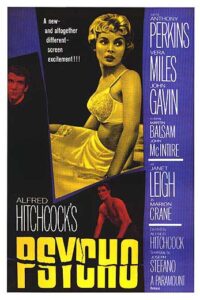
Synopsis:
A secretary (Janet Leigh) on the lam with $40,000 of her boss’s money stops at a motel on her way to see her fiance (John Gavin), and becomes acquainted with the motel’s shy, twitchy owner, Norman Bates (Anthony Perkins). When she’s brutally murdered in the shower by Norman’s elderly mother, Leigh’s fiance, sister (Vera Miles), and a private detective (Martin Balsam) all show up at the Bates Motel to investigate her mysterious disappearance.
|
|
Genres, Themes, Actors, and Directors:
- Amateur Sleuths
- Anthony Perkins Films
- Evil Mothers
- Fugitives
- Grown Children
- Horror
- Janet Leigh Films
- John McIntire Films
- Martin Balsam Films
- Mysterious Disappearance
- Search
Response to Peary’s Review:
Peary labels this classic Hitchcockian thriller a “manipulative sex and horror masterpiece”, calling it “far and away the most frightening film ever made” — but he notes with a sad caveat that today’s audiences “usually aren’t scared at all.” Indeed, certain elements of Psycho have been so often mimicked and/or over-analyzed that it’s difficult to truly appreciate the impact the film must have had upon 1960 viewers, who were unfamiliar with either the film’s blatant McGuffins (Leigh doesn’t remain the protagonist for long) or the shocking identity twist at the end. Regardless, today’s film fanatics can still watch and appreciate the masterful techniques used by Hitchcock, who consistently foils our expectations and keep us on the edge of our seats — and not just during the infamous “shower scene”.
Anthony Perkins — who, for better or for worse, remained inextricably linked to his “Norman Bates” identity throughout the remainder of his life — gives the most impressive, carefully nuanced performance in the film. He was intentionally cast against type (in the original novel, Norman is middle-aged, pudgy, and balding) to heighten the sexual tension felt between Norman and Marion (Leigh), and to make him more sympathetic to viewers — an essential move, given that Marion’s unexpected death leaves us suddenly having to “relate” to Norman instead. Leigh and Vera Miles are well-cast as the similar-looking Crane sisters (one tragically doomed, the other tenaciously persistent), while Martin Balsam makes an effective private eye. Perhaps the most audacious “character” in the film, however, is Bernard Herrmann’s screeching, all-strings score — it’s nearly impossible to separate this infamous music from the film as a whole.
Note: The blatant sexual undertones Hitchcock and screenwriter Joseph Stefano incorporate throughout the film are truly ahead of their time: from the very first scene — in which busty, unmarried Janet Leigh lies post-coitally on a motel bed in a form-fitting bra and slip — to the nude “shower scene”, to Norman’s obvious sexual perversions, we’re both titillated and disturbed.
Redeeming Qualities and Moments:
- Anthony Perkins as Norman Bates
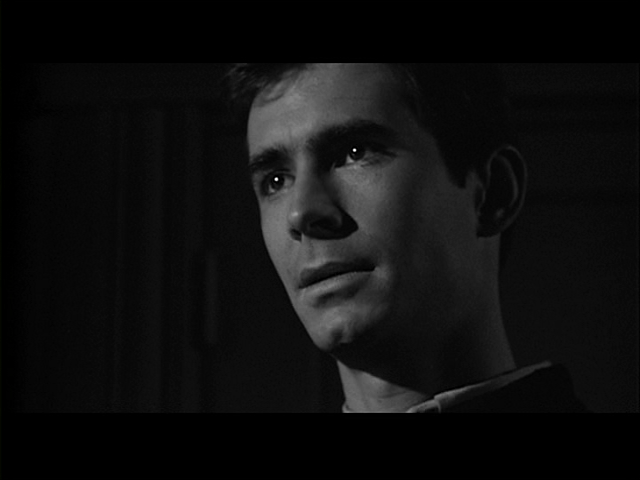
- Janet Leigh as Marion Crane
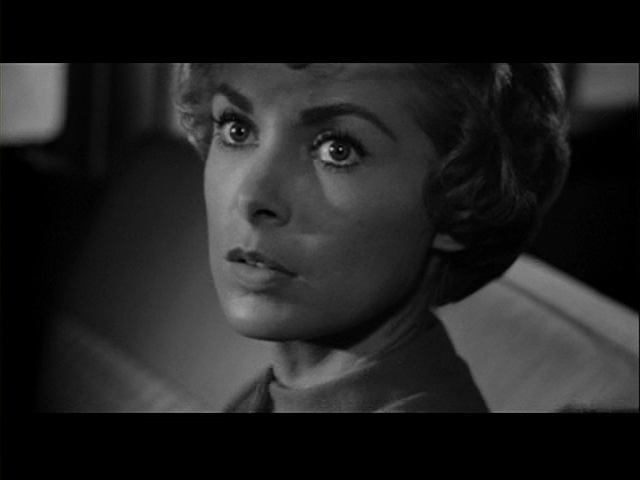
- Vera Miles as Marion’s concerned sister, Lylah
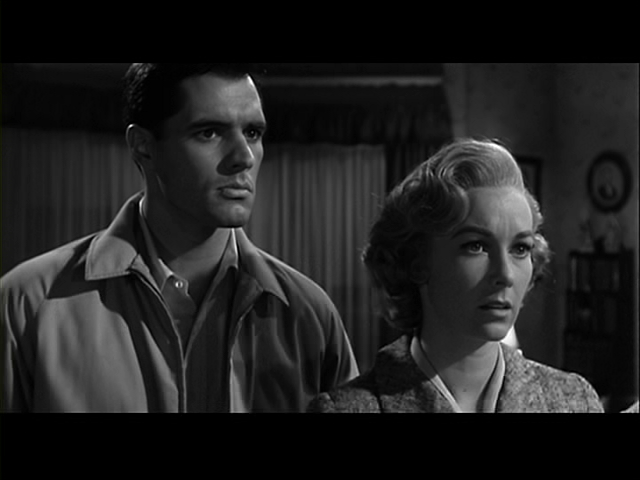
- Martin Balsam as a no-nonsense private eye
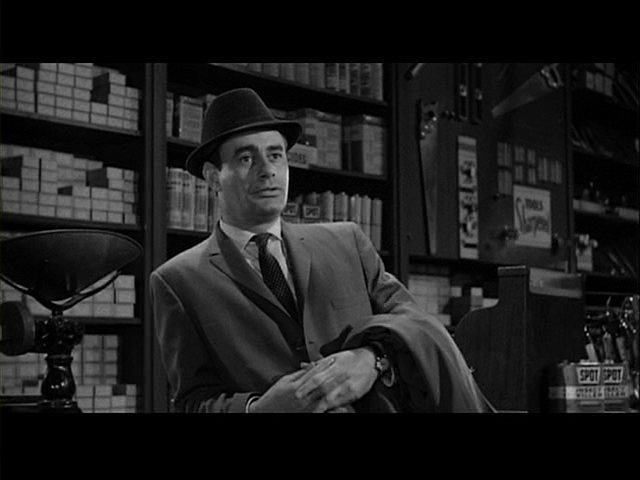
- The infamous, oft-studied “shower scene”

- Many truly frightening thrills and chills
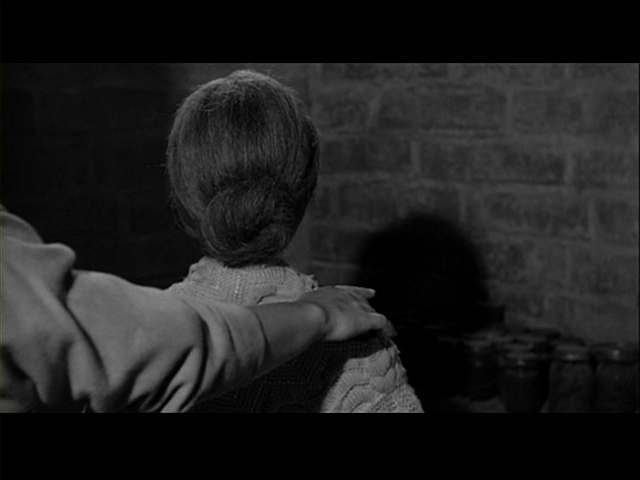
- John Russell’s b&w cinematography
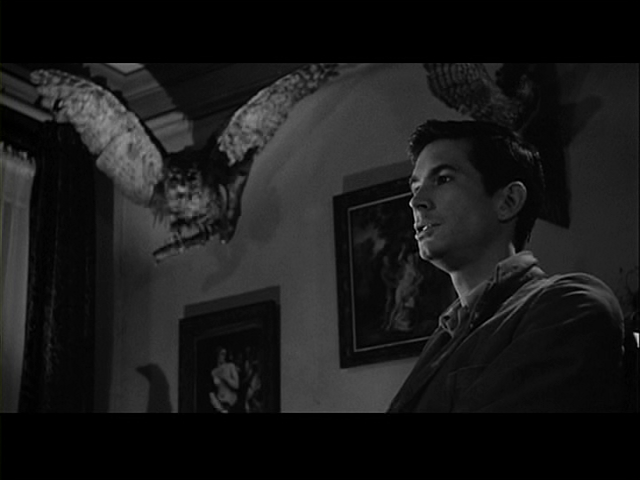
- Saul Bass’s opening titles
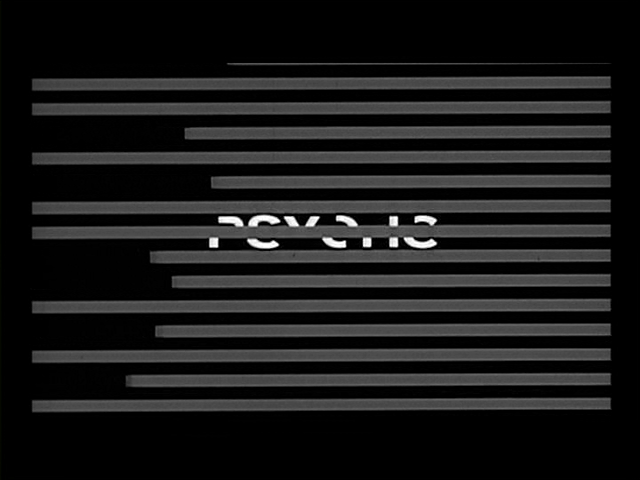
- Joseph Stefano’s clever, literate adaptation of Robert Bloch’s novel
- Bernard Herrmann’s instantly recognizable, all-strings score
Must See?
Definitely — this one should be at the top of any film fanatic’s must-see list. Discussed at length in Peary’s Cult Movies 3 (1988).
Categories
- Cult Movie
- Genuine Classic
- Important Director
- Oscar Winner or Nominee
(Listed in 1001 Movies You Must See Before You Die)
Links:
|









2 thoughts on “Psycho (1960)”
Who would deny that ‘Psycho’ is a must?
And SO much has been written about it in so many places (at IMDb alone, there are 63 pages of viewer comments!) that there’s precious little to add.
All self-respecting (or even self-disrespecting) film fanatics need to see it. I spoke with a much younger ff recently who actually said he’d never seen it. When I asked why, he said something about not really appreciating black-and-white films. I was speechless.
Although it feels icky to say it, ‘Psycho’ is probably my favorite Hitchcock film. (I would feel less icky if I called ‘Shadow of a Doubt’ my favorite; but, quite honestly, ‘SoaD’ is next in line.) It actually feels icky calling any horror film a ‘favorite’ at all. Considering the content of the best of them, it just doesn’t seem right.
Be that as it may…one of the main things that sets ‘Psycho’ apart – and I noticed this last night when it came on TCM – is that friggin’ opening ‘knife attack’ of Bernard Herrmann’s brilliant score! It (along with Saul Bass’ titles) never fails to grab me and pull me in with the power of centrifugal force! (…usually for the duration, but I fought the temptation last night cause I really needed sleep.)
Another aspect of its genius is its structure: the credits prepare us for terror; against expectations, we’re then literally dropped into what is arguably the most erotic scene Hitchcock ever filmed; from there, we’re taken to a scene of subtle comedy at Leigh’s place of work: not only is client Frank Albertson amusing but Hitch’s daughter Patricia is hilarious as Caroline (“He was flirting with you. I guess he noticed my wedding ring.”). [People don’t often mention the amount of humor that is actually in this film.] At this point, the tension builds slowly, inexorably, to ‘The Big Scene’, builds again to something unexpected, then is maintained at simmer until the final shocker. (Some complain about the denouement. Today, it does come off as of the period – personally it doesn’t bother me. And it does lead to an added shock – it took me many viewings until I noticed the superimposition on Perkins’ face.)
Easily in – oh, the top 25 films of all time. And, though I’ve practically said so already, it easily lends itself to repeat viewings. Everyone involved here is at the top of their game.
Best scene: Norman and Marion (letters in names off by just one; what can it mean?) in the parlor.
Sidenote for gay audiences: watching Perkins as he walks up the staircase.
A version of the script is at IMSDb (it shows what would become interesting cuts as well as changes; i.e., ‘Mary’ would become ‘Marion’).
cf: ‘The Texas Chainsaw Massacre’, ‘The Silence of the Lambs’, ‘Deranged’ (supposedly the Ed Gein story closest to the facts), ‘Psycho II’, Psycho III’, ‘Psycho IV: The Beginning’ (tv)
I Like The Shower Scene And Bernard Herrmann’s Score.